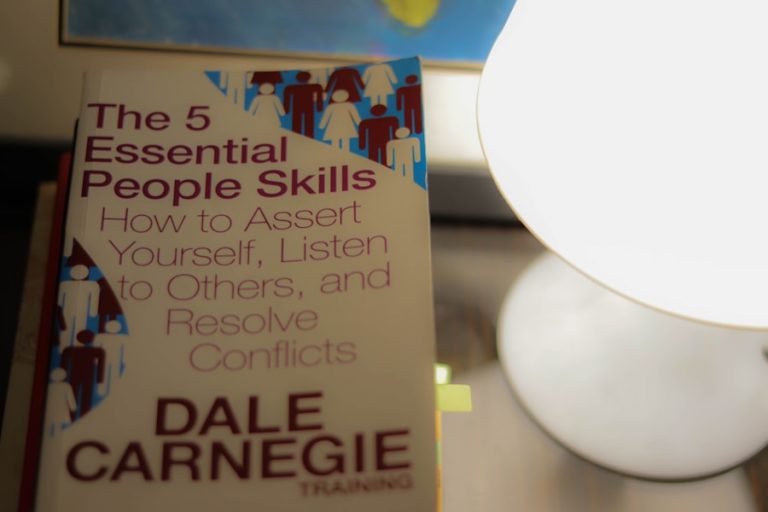In today’s competitive job market, the distinction between hard and soft skills has become increasingly significant. Hard skills refer to the technical abilities and knowledge that are often quantifiable and can be measured through certifications, degrees, or specific training.
These skills are essential for performing specific tasks and are typically job-specific.
For instance, a software developer must possess programming languages such as Java or Python, while a financial analyst should be proficient in data analysis tools like Excel or SQL. Employers often prioritize these skills during the hiring process, as they directly relate to an individual’s ability to perform the job effectively. On the other hand, soft skills encompass interpersonal attributes and personality traits that enable individuals to interact harmoniously with others.
These include communication, teamwork, problem-solving, and emotional intelligence. While hard skills may get a candidate through the door, it is often the soft skills that determine their long-term success within an organization. According to a report by Talent Culture, companies increasingly recognize that employees with strong soft skills contribute to a positive workplace culture and improved team dynamics.
As such, understanding the importance of both hard and soft skills is crucial for anyone looking to advance their career.
Key Takeaways
- Hard and soft skills are both important for professional success
- Developing hard skills is crucial for achieving success in a specific field or industry
- Improving soft skills such as communication and emotional intelligence is essential for professional growth
- Balancing hard and soft skills is key to thriving in the workplace
- Mastering communication skills and nurturing emotional intelligence are essential for effective leadership and career advancement
Developing hard skills for success
Developing hard skills is a structured process that often involves formal education, training programs, or self-directed learning. Many professionals choose to pursue certifications or degrees that align with their career goals. For example, an aspiring data scientist might enroll in a specialized boot camp or online course to learn programming languages and data analysis techniques.
This formal education not only equips individuals with the necessary knowledge but also enhances their credibility in the eyes of potential employers. In addition to formal education, hands-on experience plays a vital role in developing hard skills. Internships, apprenticeships, and project-based work provide opportunities for individuals to apply their knowledge in real-world scenarios.
This practical experience not only solidifies their understanding but also allows them to build a portfolio that showcases their capabilities. As highlighted by HR Examiner, continuous learning is essential in today’s fast-paced work environment; professionals must stay updated on industry trends and technological advancements to remain competitive.
Improving soft skills for professional growth

Improving soft skills often requires a more nuanced approach than developing hard skills. Unlike technical abilities, soft skills are inherently subjective and can be more challenging to quantify. However, there are several effective strategies for enhancing these essential attributes.
One of the most effective methods is through self-reflection and feedback from peers or mentors. By seeking constructive criticism and being open to personal growth, individuals can identify areas for improvement and work on them systematically. Another powerful way to enhance soft skills is through active participation in team activities or group projects.
Engaging with colleagues in collaborative settings fosters communication, teamwork, and problem-solving abilities. Additionally, attending workshops or seminars focused on leadership and interpersonal skills can provide valuable insights and techniques for improvement. According to HR Zone, organizations that invest in soft skill development not only see enhanced employee performance but also benefit from increased employee satisfaction and retention.
Balancing hard and soft skills in the workplace
| Skills | Importance | Percentage |
|---|---|---|
| Hard Skills | Technical knowledge | 60% |
| Hard Skills | Data analysis | 55% |
| Hard Skills | Project management | 50% |
| Soft Skills | Communication | 70% |
| Soft Skills | Teamwork | 65% |
| Soft Skills | Problem-solving | 60% |
Striking a balance between hard and soft skills is essential for achieving overall success in the workplace. While technical expertise is crucial for executing specific tasks, the ability to communicate effectively and collaborate with others can significantly impact an individual’s career trajectory. Employers increasingly seek candidates who possess a blend of both skill sets, as this combination leads to more effective teams and improved organizational performance.
To achieve this balance, professionals should actively seek opportunities to develop both types of skills simultaneously. For instance, participating in cross-functional projects allows individuals to apply their technical knowledge while also honing their interpersonal abilities. Furthermore, organizations can foster a culture that values both hard and soft skills by providing training programs that address both areas.
As noted by Smart Recruiters, companies that prioritize this balance are better positioned to adapt to changing market demands and drive innovation.
Mastering communication skills for effective leadership
Effective communication is a cornerstone of successful leadership. Leaders who can articulate their vision clearly and inspire their teams are more likely to achieve organizational goals. Mastering communication skills involves not only conveying information effectively but also actively listening to others and fostering an open dialogue within the team.
This two-way communication builds trust and encourages collaboration among team members.
To enhance communication skills, leaders should practice active listening techniques, such as summarizing what others have said and asking clarifying questions. Additionally, providing regular feedback and recognition can help create an environment where team members feel valued and motivated to contribute their ideas.
According to Talent Culture, leaders who prioritize communication foster a culture of transparency and engagement, which ultimately leads to higher levels of employee satisfaction and productivity.
Nurturing emotional intelligence for career advancement

Emotional intelligence (EI) is increasingly recognized as a critical component of professional success. It encompasses the ability to understand one’s emotions and those of others, enabling individuals to navigate social complexities effectively. Leaders with high emotional intelligence can empathize with their team members, manage conflicts constructively, and create a positive work environment.
To nurture emotional intelligence, individuals can engage in self-awareness practices such as journaling or mindfulness meditation. These techniques help individuals recognize their emotional triggers and responses, allowing them to manage their reactions more effectively. Additionally, seeking feedback from colleagues can provide valuable insights into how one’s behavior impacts others.
As highlighted by HR Examiner, organizations that prioritize emotional intelligence in their leadership development programs often see improved employee engagement and retention rates.
Cultivating adaptability and resilience in the workplace
In an ever-evolving work environment, adaptability and resilience have become essential traits for professionals at all levels. The ability to adjust to new challenges and bounce back from setbacks is crucial for maintaining productivity and morale within teams. Cultivating these qualities requires a proactive approach that involves embracing change rather than resisting it.
One effective strategy for fostering adaptability is to encourage a growth mindset among employees. This mindset promotes the belief that abilities can be developed through dedication and hard work. Organizations can support this by providing training opportunities that challenge employees to step outside their comfort zones.
Additionally, creating a supportive culture where failure is viewed as a learning opportunity can help individuals build resilience over time. According to HR Zone, companies that cultivate adaptability are better equipped to navigate uncertainty and drive innovation.
Integrating hard and soft skills for overall success
Ultimately, the integration of hard and soft skills is key to achieving overall success in one’s career. Professionals who can leverage their technical expertise while also demonstrating strong interpersonal abilities are more likely to excel in their roles and advance within their organizations. This holistic approach not only enhances individual performance but also contributes to a positive workplace culture.
To effectively integrate these skill sets, individuals should seek opportunities for continuous learning and development across both domains. This might involve pursuing additional certifications while also participating in workshops focused on communication or leadership development. Organizations can play a pivotal role by fostering an environment that values both hard and soft skills through training programs and mentorship initiatives.
As noted by Talent Culture, this integrated approach not only benefits individual employees but also drives overall organizational success by creating a more engaged and capable workforce. In conclusion, understanding the importance of both hard and soft skills is essential for anyone looking to thrive in today’s dynamic work environment. By developing technical expertise while also honing interpersonal attributes, professionals can position themselves for long-term success in their careers.
Balancing these skill sets not only enhances individual performance but also contributes to a positive workplace culture that fosters collaboration and innovation.
When discussing the importance of hard skills versus soft skills in the hiring process, it is crucial to consider how technology is revolutionizing recruitment. In a related article on ChattyHiring, the use of innovative technology in the hiring process is explored. This article delves into how AI tools are being used by HR specialists to boost candidate selection and improve the overall candidate experience. By leveraging these advanced technologies, companies can better assess both hard and soft skills in potential hires, ultimately leading to more successful and efficient recruitment processes.
FAQs
What are hard skills?
Hard skills are specific, teachable abilities that can be quantified and measured. They are typically related to a person’s professional knowledge and technical expertise in a certain field, such as computer programming, accounting, or foreign language proficiency.
What are soft skills?
Soft skills, also known as interpersonal or people skills, are the non-technical abilities that relate to how a person interacts with others. These skills include communication, teamwork, problem-solving, adaptability, and leadership.
What is the difference between hard skills and soft skills?
The main difference between hard skills and soft skills is that hard skills are teachable and measurable, while soft skills are more difficult to quantify and are often related to a person’s emotional intelligence and personality traits.
Why are hard skills important?
Hard skills are important because they are the specific abilities and expertise that are required to perform a particular job or task. Employers often look for candidates with the necessary hard skills to ensure they can effectively carry out their job responsibilities.
Why are soft skills important?
Soft skills are important because they are essential for effective communication, teamwork, and overall workplace success. Employers value soft skills as they contribute to a positive work environment and can enhance productivity and collaboration among employees.
Can hard skills and soft skills be learned?
Both hard skills and soft skills can be learned and developed over time. Hard skills can be acquired through education, training, and practice, while soft skills can be honed through experience, self-reflection, and interpersonal interactions.
-

A passionate advocate for the future of HR innovation. With expertise in leveraging AI to revolutionize recruitment processes, Carlos has a clear vision: empower HR teams while creating meaningful candidate experiences.
View all posts





